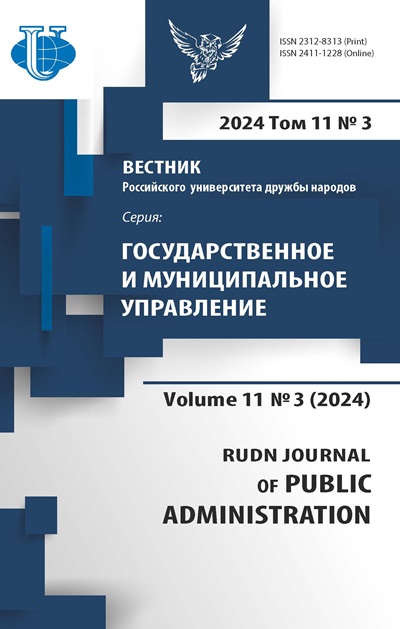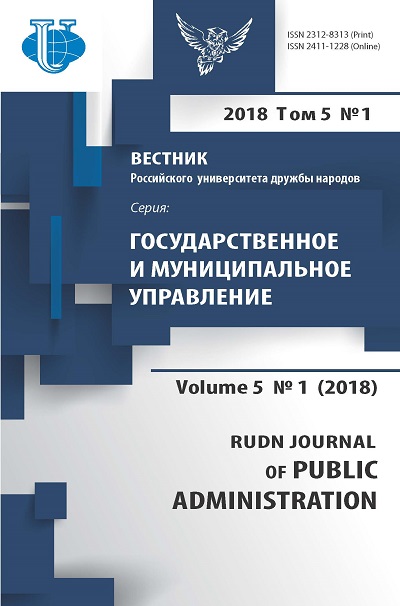REGULATORY AND REGULATING DOCUMENTATION IN SCIENCE AND EDUCATION: PECULIARITIES OF LANGUAGE AND FORMULATION
- Authors: Kliuchrev G.A.1, Neverov A.V.2
-
Affiliations:
- Federal Research Sociological Center (the Russian Academy of Sciences)
- Peoples Friendship University of Russia (RUDN University)
- Issue: Vol 5, No 1 (2018)
- Pages: 33-52
- Section: ORGANIZATIONAL DOCUMENTATION OF PUBLIC ADMINISTRATION
- URL: https://journals.rudn.ru/public-administration/article/view/19778
- DOI: https://doi.org/10.22363/2312-8313-2018-5-1-33-52
Cite item
Full Text
Abstract
The modern administrative system of the Russian Federation is characterized by an increasing number of regulatory aspects. This property is especially widespread in the sphere of science and education. According to stakeholders, it often leads to excessive formalization and bureaucratization of processes in the work of scientific and educational organizations. Experts identify different reasons for the growth of bureaucratization: the complexity of interaction, the shortcomings of organizational and business processes, the problems of structure and distribution of responsibilities, insufficient competence of specialists, etc. However, the issues of stakeholders communication, so-called the “bureaucratic language” that is expressed in different approaches to the creation of regulatory and regulatory documents, are not fully revealed. The article shows how the language of modern regulatory influences the complexity of bureaucratic processes, describes a number of reasons that determine these features, and also makes the proposals, how to reduce their negative impact.
About the authors
Grigoriy Arturovich Kliuchrev
Federal Research Sociological Center (the Russian Academy of Sciences)
Author for correspondence.
Email: kliucharevga@mail.ru
Doctor of Philosophy, Professor, the Director of the Center of the Sociology of Education, Science and Culture of the Federal Scientific and Research Sociological Center of RAS
Krzhizhanovskogo St., 24/35-5, 117218, Moscow, RussiaAlexander Viktorovich Neverov
Peoples Friendship University of Russia (RUDN University)
Email: neverov_av@rudn.university
PhD in Sociology, Senior lecturer of the Department of Sociology of the Faculty of Humanities and Social Sciences, RUDN University
6 Miklukho-Maklaya St., 117198, Moscow, RussiaReferences
- Bestuzhev-Lada I.V. Prognoznoe obosnovanie social’nyh novovvedenij. M.: Nauka, 1993; Innovaciya // Kul’turologiya. Slovar’ / pod red. I.F. Kefeli. SPb.: BGTU, 1997.
- Klyucharev G.A., Neverov A.V. Proekt «5-100»: nekotorye promezhutochnye itogi // Vestnik RUDN. Seriya: Sociologiya. 2018. T. 18. No 1. S. 100–116.
- Krinchenko A.I. Innovaciya // Kul’turologicheskij slovar’. M.: Akad. proekt, 2000.
- Martine A. Osnovy obshchej lingvistiki. V kn.: Novoe v lingvistike, vyp. 3. M., 1963.
- Polonskij YA. // RAN potrebovala ot molodyh uchenyh sdavat’ na konkurs diskety 3,5”. URL: http://www.mk.ru/science/2016/03/10/ran-potrebovala-ot-molodykh-uchenykhsdavat-sdavat-na-konkurs-diskety-35.html.
- Shumpeter J.A. Teoriya ehkonomicheskogo razvitiya. M.: Progress, 1982;
- Yakobson R. Lingvistika i poehtika // Strukturalizm: «za» i «protiv». M., 1975.
- Rogers E.M. Diffusion of innovations. New York, Free Press, 2003.
















